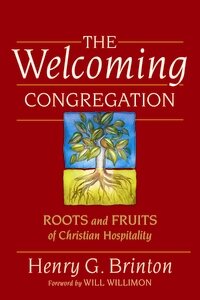Henry G. Brinton, The Welcoming Congregation: Roots and Fruits of Christian Hospitality. Westminster John Knox Press, 2012.
Referenced in:
LifeandLeadership.com Summary
This volume shares the results of the author’s study of churches that are reputably hospitable, both in the U.S. and abroad: Iona Community in Scotland, Saddleback Church in California, Reconciliation Parish in Germany (built in the old “death strip” that divided East and West Germany), and the Washington National Cathedral in Washington DC. The book is structured so that ministry or leadership teams considering how to make their churches more welcoming may follow the content, discussion questions, action plans, and preaching suggestions.
Brinton’s orientation is mainline Proteestant, identifying theologically and practically with what he calls the “moderate religious middle.” Some, like me, will not agree with the integration of hospitality with “inclusion,” which is more sociologically based. For example, he praises Saddleback Church for their successes on hospitality, but also criticizes their conservative stance on LGBT issues. However, the book is full of creative, practical suggestions for anyone interested in the subject, all from a very warm, pastoral spirit.
Brinton’s biblical basis is Isaiah 56:7, “My house shall be called a house of prayer for all peoples.” He uses these and other passages, as well as lessons from church history, to make a case for becoming non-homogenous communities that witness Christ’s hospitality to a divided culture. He shows how the Mosaic teachings are designed to help Israel welcome strangers, drawing on their solidarity with the marginalized from their experience in Egypt. Jesus continues this hosptitable spirit in his embrace of the downtrodden. While these passages uphold God’s vision and the call to follow Jesus in radical discipleship, he realizes, on a practical level, breaking these boundaries is easier said than done.
“Most of us have a natural fear of strangers, and we are reminded every day of the political, racial, cultural, sexual, and economic distinctions that so often divide us. We know that we are most comfortable with people who look and act like ourselves, and that it is easiest to build community among groups of like minded-individuals.”
Publisher’s Description
This practical book by pastor and writer Henry G. Brinton studies the biblical basis for Christian hospitality and how it is practiced in congregations today. While recognizing the challenges for embracing all people in the life of the church, Brinton offers a helpful guide for creating a hospitable congregation and welcoming others through spiritual formation, reconciliation, and outreach. He includes discussion questions and an action plan in each chapter.
“Because church members often have the aspiration to receive strangers but not the skills or techniques, I offer this book as a user-friendly and useful guide to Christian hospitality. It tells stories of inclusion, contains examples of the best practices of truly welcoming congregations from across the country and overseas, and offers suggestions about hospitable practices that can be used by churches across the social and theological spectrum. I offer this guide to laypersons, clergy, and other religious professionals because I am a parish pastor who believes that hospitality is the key to becoming an uncommon Christian community-one that embraces all people with God’s love and grace.” – From the introduction
About the Author
Henry G. Brinton is Senior Pastor of Fairfax Presbyterian Church in Fairfax, Virginia. He is a regular contributor to USA Today and the Washington Post, as well as the author of several books, including Balancing Acts: Obligation, Liberation, and Contemporary Christian Conflicts.
**For additional information on this resource, including reviews, click the bookstore links. Check the reference at page top or the links below for resource guides on related topics.***
Related Areas
See Other Resources on Ministry Involvement:
- Gift-Based Ministry, Involvement
- Greeting and New Member Integration
- Managing Volunteers
- Ministry Teams
- Spiritual Gifts
See Resources on Over 100 Areas of Ministry Leadership


